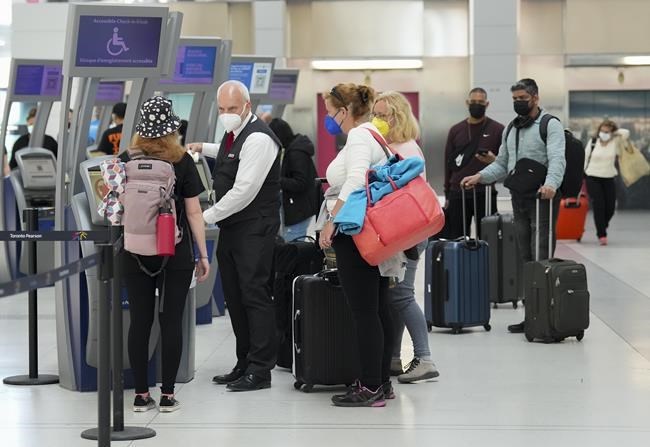Canada's transport regulator aims to beef up its passenger rights charter, placing more stringent rules around reimbursement by airlines — though some advocates say the rules fall short of frameworks in other countries.
New regulations effective Sept. 8 will require carriers to either refund passengers or rebook them, at the traveller's choice, if a flight is cancelled or delayed by three hours or more, the Canadian Transportation Agency said Wednesday.
Previously, the passenger rights regime only required refunds for flight disruptions that were within the airline's control, which excluded situations ranging from weather to war to unscheduled mechanical issues.
“These regulations will close the gap in the Canadian air passenger protection regime highlighted by the COVID-19 pandemic and ensure that even when cancellations and lengthy delays occur that are outside the airline’s control passengers will be protected if the airline cannot complete their itinerary within a reasonable period of time," agency chair France Pégeot said in a release.
The regulations match policies implemented by Air Canada in 2021, said spokesman Peter Fitzpatrick.
Thousands of Canadians have faced a slew of long delays and flight cancellations as airlines and security and customs agencies struggle to handle a staffing shortage amid the recent travel surge. The problem is expected to leave summer travellers without protection from the new rules, which don't kick in until fall.
The regulations will require airlines to offer a rebooking or refund within 30 days if they cannot provide a new reservation within 48 hours of a flight cancellation or three-hour-plus delay.
Any unused portion of a ticket must be covered, including "any unused add-on service paid for," the regulator said. And a refund must be the same as the original payment method. That means a credit card purchase could not be reimbursed with a travel voucher, as most Canadian airlines did for nearly a year starting in March 2020 amid hundreds of thousands of cancellations set off by the pandemic.
Ian Jack, a consumer rights advocate with the Canadian Automobile Association, called the revised charter "a very good but limited advance" in passenger protections because while airlines will be forced to pay refunds, they can still avoid paying compensation of between $400 and $1,000 due to factors outside their control.
"There's an incentive here for the carriers to declare mechanical problems. As a passenger, it's very hard for you to ever verify that," Jack said.
His advocacy group is calling on Ottawa to mandate that airlines publish data around delays and cancellations, as the United States does, to encourage competition and expose any disproportionate numbers.
Gabor Lukacs, president of the Air Passenger Rights advocacy group, called the fresh framework a "sham."
He said mandating a refund or a rebooking only if the airline cannot secure another seat on a plane that leaves within two days of the original departure time fails to serve traveller needs in situations ranging from weekend visits to short work trips.
"For a Friday flight, if the flight is cancelled, the airline will be able to offer the passenger an outbound flight for Sunday that the passenger will never be able to take because they work on Monday. And the airline can still pocket the money," Lukacs said in an interview.
"We live in a very fast-paced world. A few hours of delay means you don't get to a funeral, a wedding, a court hearing."
The European Union requires airlines to provide a plane seat within five hours of the initial departure — not 48 — or a refund must be offered.
In the EU and U.S., passengers must also be reimbursed for a flight cancellation within seven days rather than 30 under Canada's new scheme.
The CTA acknowledged the change doesn't align with requirements in the EU or U.S., but said it accounts for the realities of Canadian carriers.
"(They) may be required to provide multiple refunds at once due to weather-related disruptions," the agency states in its analysis of the regulations' impact.
Airlines argue the Air Passenger Protection Regulations, which came into force in 2019, already go too far.
Canadian carriers asked a Federal Court of Appeal panel in April to quash rules that bolster compensation for passengers subjected to delayed flights and damaged luggage.
Air Canada and Porter Airlines Inc., along with 16 other appellants said the passenger rights charter violates global standards and should be rendered invalid for international flights.
Under the three-year-old federal rules, passengers have to be compensated up to $2,400 if they were denied boarding — so-called flight bumping — because a trip was overbooked, and receive up to $2,100 for lost or damaged luggage. Delays and other payments for cancelled flights warrant compensation of up to $1,000.
This report by The Canadian Press was first published June 22, 2022.
Companies in this story: (TSX:AC)
Christopher Reynolds, The Canadian Press



